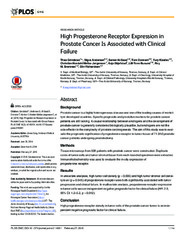High progesterone receptor expression in prostate cancer is associated with clinical failure
Permanent lenke
https://hdl.handle.net/10037/8690Dato
2015-02-27Type
Journal articleTidsskriftartikkel
Peer reviewed
Forfatter
Grindstad, Thea; Andersen, Sigve; Al-Saad, Samer; Dønnem, Tom; Kiselev, Yury; Melbø-Jørgensen, Christian; Skjefstad, Kaja; Busund, Lill-Tove; Bremnes, Roy M.; Richardsen, ElinSammendrag
Methods Tissue microarrays from 535 patients with prostate cancer were constructed. Duplicate cores of tumor cells and tumor stromal tissue from each resected specimen were extracted. Immunohistochemistry was used to evaluate the in-situ expression of progesterone receptor.
Results In univariate analyses, high tumor cell density (p = 0.006) and high tumor stromal cell density level (p = 0.045) of progesterone receptor were both significantly associated with tumor progression and clinical failure. In multivariate analysis, progesterone receptor expression in tumor cells was an independent negative prognostic factor for clinical failure (HR: 2.5, 95% CI: 1.2–5.2, p = 0.012).
Conclusion High progesterone receptor density in tumor cells of the prostate cancer tumor is an independent negative prognostic factor for clinical failure.


 English
English norsk
norsk